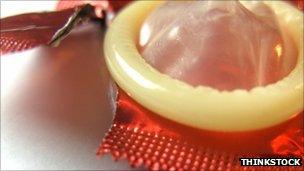Curriculum plan 'waters down sex education' experts warn
- Published

Sex education should be "unambiguously" taught in science lessons, urge experts
Sex education in schools is at risk of being "watered down" if proposed changes to England's science curriculum go ahead, experts have warned.
Sex education should be "unambiguously" included in science lessons, a coalition of organisations has urged.
"The science proposals omit any reference to genitalia, puberty or sexual health", says the group in a letter to the Times newspaper.
A government spokeswoman said the claims were "misleading".
"The draft science curriculum includes as much sex education as the current curriculum," said the spokeswoman for the Department for Education.
"Children will continue to be taught about their bodies, physical development and reproduction."
'Adult squeamishness'
The letter is signed by more than 100 organisations and individuals ranging from the Royal College of Obstetricians and Gynaecologists to Mumsnet, the Sex Education Forum and the National Children's Bureau.
It says the planned changes will not help schools create an honest and open culture around sex and relationships, and urges the government "to put any adult squeamishness about sex aside".
"The National Curriculum science is the only compulsory part of sex and relationships in education in schools and must teach children about how their bodies work to prepare them for growing up and to protect them from harm," it says.
In particular the group is concerned that children will not be taught about sexual reproduction and puberty early enough - and that some will already be experiencing changes in their bodies before they have been taught about them.
The Sex Education Forum (SEF) says that the plans leave a gap in teaching about reproduction in primary school.
The forum highlights the section in the draft which says that six- and seven-year-olds should be taught about the process of reproduction and growth in animals but which also says that at this age pupils "should not be expected to understand how reproduction occurs".
The group adds that the draft curriculum does not mention reproduction again until the end of primary school when the guidance for teaching 10 and 11-year-olds says "they should find out about different types of reproduction, including sexual and asexual reproduction in plants, and sexual reproduction in animals".
'Age-appropriate'
Lucy Emmerson of the Sex Education Forum said: "At a time when children can easily access explicit sexual content on the internet, there needs to be a reliable source of information on growing up and sex.
"The government's own sexual health framework calls for an 'open and honest culture' and to improve knowledge about contraception, but this is not going to be supported by the science curriculum proposals.
"It is the lack of courage to talk openly and honestly about sex and relationships and to guarantee every child's right to information about their health that has resulted in the UK having one of the highest teenage pregnancy rates amongst developed countries.
"These proposals will result in more children starting puberty without knowing what is happening to them and without the words to name genitals. This is a safeguarding issue as well as a health issue."
A Department for Education spokeswoman said: "While the new draft curriculum focuses on core science, we expect teachers to cover sexual health when they teach about reproduction.
"In addition, the Secretary of State's statutory guidance ensures all pupils receive age-appropriate sex and relationship education. Pupils must learn about sexually transmitted infections such as HIV/Aids, as well as the importance of stable relationships and marriage. They must also learn the how the law applies to sexual relationships and understand concepts such as sexual consent. This has not changed."
- Published8 August 2012
- Published2 November 2012
- Published25 October 2011
- Published12 October 2011
- Published5 April 2011